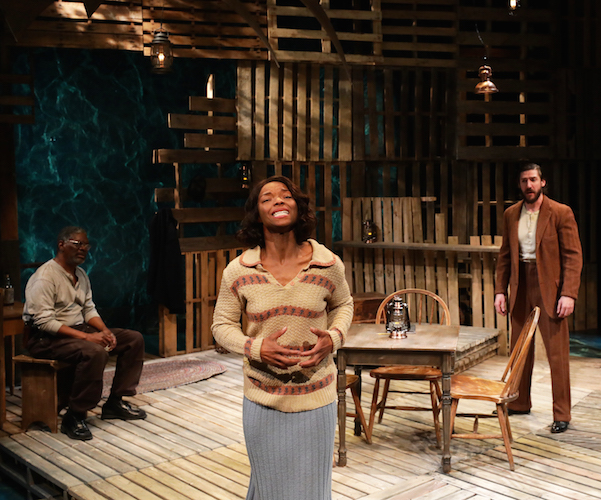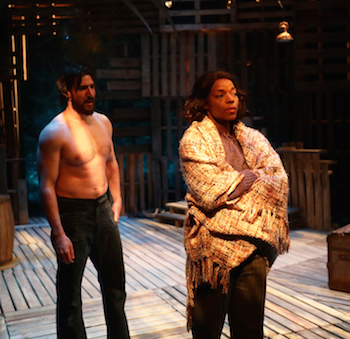Theater Review: “Anna Christie” — A Memorable Look at Life on the Margins
The Lyric Stage production of Anna Christie does right by Eugene O’Neill’s brilliance.
Anna Christie by Eugene O’Neill. Adapted and directed by Scott Edmiston. Staged by the Lyric Stage Company of Boston, 140 Clarendon Street, Boston, MA, through May 5.

Lindsey McWhorter (center), Dan Whelton (r), and Johnny Lee Davenport (i) in the Lyric Stage Company production of “Anna Christie.” Photo: Mark S. Howard.
By Roberta Silman
In his prime Eugene O’Neill was considered our Aeschylus or Shakespeare, and there are still some people who would not consider that an exaggeration — me, among them. So high praise to Spiro Veloudos, the Producing Artistic Director and Scott Edmiston who adapted and directed this new production of Anna Christie, which was first staged in 1921 — almost a hundred years ago! — and won O’Neill his second Pulitzer Prize. He would go on to win two more Pulitzers and the Nobel Prize for Literature in 1936, which is really amazing, since his greatest plays were written after that. The very greatest (in the opinion of some critics) Long Day’s Journey Into Night was actually first produced after O’Neill’s death in 1953 at the age of 65.
That’s why I want to begin by quoting from Edmiston’s essay in the program. He writes:
You know, you wouldn’t be sitting in this theatre right now if it wasn’t for Eugene O’Neill. He created American drama. Prior to O’Neill, America had entertainment. We had melodrama. We had vaudeville. O’Neill elevated the American stage into the realm of art. Though today his reputation lies primarily with his three late masterpieces, Long Day’s Journey Into Night (1942), The Iceman Cometh (1942) and Moon for the Misbegotten (1947), he wrote nearly 50 other plays.
That may come as a surprise to lots of readers, especially those in their 20s or younger. And why it is so important that they see this superb production.
In Anna Christie, O’Neill explores themes that are as relevant today as they were then: power, especially among parents and children, the place of women, the pull of sexual attraction, the shame about sex outside of the “norm,” the damage wrought by drink and drugs, and the notion of “the other” brought on by prejudice and/or racism. With Anna O’Neill began his path to greatness by writing a play that had the heft of Ibsen or Strindberg or Shaw. Its premise is also surprisingly modern. A seafaring father abandons his wife and daughter, and they end up with relatives on a farm in the mid-west. After the mother dies, the daughter is left unprotected, endures the trauma of rape, and becomes a prostitute. The play begins when she returns east to her sailor father after many years; yet their tentative, sometimes tender reunion runs into trouble when the pair rescue an Irish sailor. Missteps made in the name of love and protection only lead to more conflict and revelation and shame. And, finally, redemption.
What makes this production so intriguing is that Edmiston has cast two wonderful African-Americans as Chris Christopherson and his daughter Anna: Johnny Lee Davenport and Lindsey McWhorter. At first I thought their race might not work in this already complicated play, but I was wrong. It not only worked, but added resonance to O’Neill’s exploration of the “other.” Here is a play about people who live on the fringes — a sailor whose very existence depends upon his fraught relationship with the “Old Devil Sea” and his daughter, who has lived her own life for too long to be dominated by a protective guilty parent who “wants only the best for her.” In bold strokes O’Neill shows us how good intentions often do pave the way to hell.

Lindsey McWhorter and Dan Whelton in the Lyric Stage Company production of “Anna Christie.” Photo: Mark S. Howard.
O’Neill certainly knew about dysfunctional families. His father was James O’Neill, a professional actor who started his career playing Shakespeare and ended up touring the country in The Count of Monte Cristo, to his own everlasting despair. And his mother had become addicted to morphine after Gene’s difficult birth in a hotel room. Like their father, he and his brothers had drinking problems all their lives, and Gene was a womanizer, as well as having three legitimate wives who found him fascinating but also difficult and sometimes surly. He also disowned his daughter Oona because she married Charlie Chaplin when she was 18 and Chaplin was 56. (One of their children is the well-known actress Geraldine Chaplin.)
But he was a genius who, despite dropping out of college, knew the theatre from the inside out and and read voraciously and created plays like no one else in this country had before. He succeeded and became the most important American playwright of the 20th century. I remember how he was the touchstone for my parents — Is it as good as O’Neill? they would ask — and our own excitement at seeing Strange Interlude, The Great God Brown, and Mourning Becomes Electra, as well as the better known plays mentioned above.
Thankfully, the Lyric Stage production does right by O’Neill’s brilliance. The authenticity of the staging is outstanding, from the set that was sometimes a bar and sometimes a barge by Janie Howland to the costumes by Charles Schoonmaker, lighting by Karen Perlow, and sound by Dewey Dellay. But the conception and direction by Edmiston provides the touch of inspiration, especially his beautiful handing of his three leads — Davenport and McWhorter and Dan Whelton — who worked nimbly with and against each other, carefully building the interlacing tensions that are so necessary to this play. And they were skillfully aided by supporting actors Nancy E. Carroll and James R. Milord. May the success of this production give us more O’Neill in seasons to come.
Roberta Silman is the author of three novels, a short story collection and two children’s books. Her new novel, Secrets and Shadows, is available on Amazon. A recipient of Fellowships from the Guggenheim Foundation and the National Endowment for the Arts, she has reviewed for The New York Times and The Boston Globe, and writes regularly for The Arts Fuse. More about her can be found at robertasilman.com and she can also be reached at rsilman@verizon.net.

